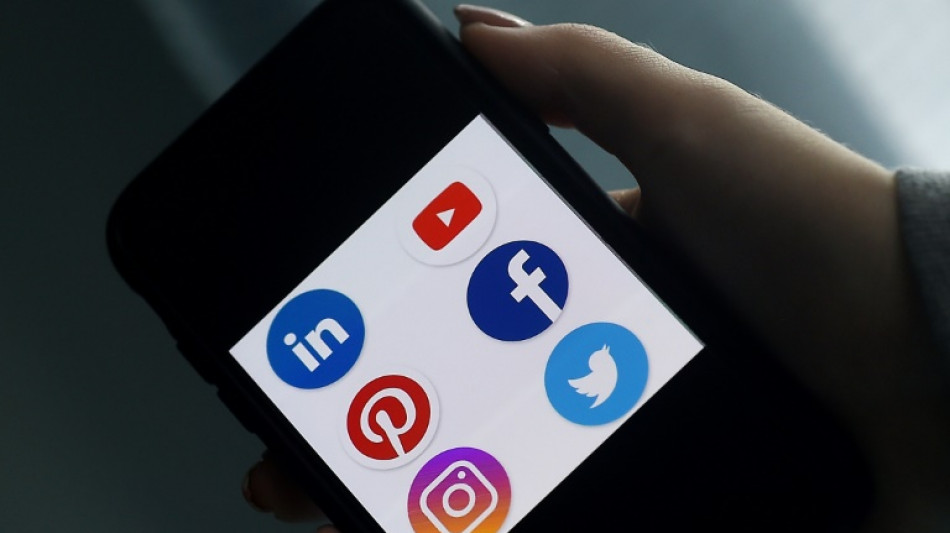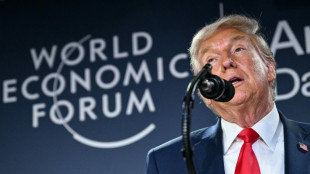
-
 Trump launches 'Board of Peace' at Davos
Trump launches 'Board of Peace' at Davos
-
Stocks rally as Trump drops Greenland tariff threats

-
 Mercedes unveil 2026 F1 car for new 2026 rules
Mercedes unveil 2026 F1 car for new 2026 rules
-
Djokovic, Sinner plough on in Melbourne, Wawrinka makes history

-
 Kitzbuehel's Hahnenkamm, the terrifying Super Bowl of skiing
Kitzbuehel's Hahnenkamm, the terrifying Super Bowl of skiing
-
'Oasis of stability': Madrid becomes luxury housing haven

-
 Swiatek says packed tennis season makes it 'impossible' to switch off
Swiatek says packed tennis season makes it 'impossible' to switch off
-
Sloppy Osaka grinds past 'mad' Cirstea to stay alive at Australian Open

-
 Iran Guards chief says 'finger on trigger', warns US against 'miscalculations'
Iran Guards chief says 'finger on trigger', warns US against 'miscalculations'
-
Imperious Sinner barrels into Australian Open round three

-
 Storms, heavy rain kill 9 children across Afghanistan
Storms, heavy rain kill 9 children across Afghanistan
-
Games giant Ubisoft suffers share price collapse

-
 Exhausted Wawrinka battles on in Melbourne farewell after five-set epic
Exhausted Wawrinka battles on in Melbourne farewell after five-set epic
-
'Too dangerous to go to hospital': a glimpse into Iran's protest crackdown

-
 Bruised European allies wary after Trump's Greenland climbdown
Bruised European allies wary after Trump's Greenland climbdown
-
Austrian ex-agent goes on trial in Russia spying case

-
 Japan suspends restart of world's biggest nuclear plant
Japan suspends restart of world's biggest nuclear plant
-
Djokovic, Swiatek roll into Melbourne third round, Keys defence alive

-
 New Zealand landslips kill at least two, others missing
New Zealand landslips kill at least two, others missing
-
Djokovic says heaving Australian Open crowds 'good problem'

-
 Swiatek in cruise control to make Australian Open third round
Swiatek in cruise control to make Australian Open third round
-
Austrian ex-agent to go on trial in Russia spying case

-
 Bangladesh launches campaigns for first post-Hasina elections
Bangladesh launches campaigns for first post-Hasina elections
-
Afghan resistance museum gets revamp under Taliban rule

-
 Multiple people missing in New Zealand landslips
Multiple people missing in New Zealand landslips
-
Sundance Film Festival hits Utah, one last time

-
 Philippines convicts journalist on terror charge called 'absurd'
Philippines convicts journalist on terror charge called 'absurd'
-
Anisimova grinds down Siniakova in 'crazy' Australian Open clash

-
 Djokovic rolls into Melbourne third round, Keys defence alive
Djokovic rolls into Melbourne third round, Keys defence alive
-
Vine, Narvaez take control after dominant Tour Down Under stage win

-
 Chile police arrest suspect over deadly wildfires
Chile police arrest suspect over deadly wildfires
-
Djokovic eases into Melbourne third round - with help from a tree

-
 Keys draws on champion mindset to make Australian Open third round
Keys draws on champion mindset to make Australian Open third round
-
Knicks halt losing streak with record 120-66 thrashing of Nets

-
 Philippine President Marcos hit with impeachment complaint
Philippine President Marcos hit with impeachment complaint
-
Trump to unveil 'Board of Peace' at Davos after Greenland backtrack

-
 Bitter-sweet as Pegula crushes doubles partner at Australian Open
Bitter-sweet as Pegula crushes doubles partner at Australian Open
-
Hong Kong starts security trial of Tiananmen vigil organisers

-
 Keys into Melbourne third round with Sinner, Djokovic primed
Keys into Melbourne third round with Sinner, Djokovic primed
-
Bangladesh launches campaigns for first post-Hasina polls

-
 Stocks track Wall St rally as Trump cools tariff threats in Davos
Stocks track Wall St rally as Trump cools tariff threats in Davos
-
South Korea's economy grew just 1% in 2025, lowest in five years

-
 Snowboard champ Hirano suffers fractures ahead of Olympics
Snowboard champ Hirano suffers fractures ahead of Olympics
-
'They poisoned us': grappling with deadly impact of nuclear testing

-
 Keys blows hot and cold before making Australian Open third round
Keys blows hot and cold before making Australian Open third round
-
Philippine journalist found guilty of terror financing

-
 Greenlanders doubtful over Trump resolution
Greenlanders doubtful over Trump resolution
-
Real Madrid top football rich list as Liverpool surge

-
 'One Battle After Another,' 'Sinners' tipped to top Oscar noms
'One Battle After Another,' 'Sinners' tipped to top Oscar noms
-
Higher heating costs add to US affordability crunch


Tech firms roll back misinformation curbs ahead of 2024 polls
As a global election season widely expected to be mired in misinformation and falsehoods fast approaches, the big US-based tech platforms are walking back policies meant to curb them, stoking alarm.
Whether it is YouTube scrapping a key misinformation policy or Facebook altering fact checking controls, the social media giants are demonstrating a certain lassitude with being the sheriffs of the internet Wild West.
The changes have come in a climate of layoffs, cost-cutting measures and pressure from right-wing groups that accuse the likes of Facebook-parent Meta or YouTube owner Google of suppressing free speech.
This has spurred tech companies to loosen content moderation policies, downsize trust and safety teams and, in the case of Elon Musk-owned X (formerly Twitter), restore accounts known for pushing bogus conspiracies.
Those moves, researchers say, have eroded their ability to tackle what is expected to be a deluge of misinformation during more than 50 major elections around the world next year, not only in the United States, but also in India, Africa and the European Union.
"Social media companies aren't ready for the 2024 election tsunami," the watchdog Global Coalition for Tech Justice said in a report this month.
"While they continue to count their profits, our democracies are left vulnerable to violent coup attempts, venomous hate speech, and election interference."
In June, YouTube said it will stop removing content that falsely claims the 2020 US presidential election was plagued by "fraud, errors or glitches," a move sharply criticized by misinformation researchers.
YouTube justified its action, saying that removing this content could have the "unintended effect of curtailing political speech."
- 'Era of Recklessness' -
Twitter, now known as X, said in November it would no longer enforce its COVID misinformation policy.
Since billionaire Musk's turbulent acquisition of the platform last year, it has restored thousands of accounts that were once suspended for violations including spreading misinformation and introduced a paid verification system that researchers say has served to boost conspiracy theorists.
Last month, the platform said it would now allow paid political advertising from US candidates, reversing a previous ban and sparking concerns over misinformation and hate speech in next year's election.
"Musk's control over Twitter has helped usher in a new era of recklessness by large tech platforms," Nora Benavidez, from the nonpartisan group Free Press, told AFP.
"We're observing a significant rollback in concrete measures companies once had in place."
Platforms are also under pressure from conservative US advocates who accuse them of colluding with the government to censor or suppress right-leaning content under the guise of fact-checking.
"These companies think that if they just keep appeasing Republicans, they'll just stop causing them problems when all they're doing is increasing their own vulnerability," said Berin Szoka, president of TechFreedom, a think tank.
For years, Facebook's algorithm automatically moved posts lower in the feed if they were flagged by one of the platform's third-party fact-checking partners, including AFP, reducing the visibility of false or misleading content.
Facebook recently gave US users the controls, allowing them to move this content higher if they want, in a potentially significant move that the platform said will give users more power over its algorithm.
- Hot topic -
The hyperpolarized political climate in the United States has made content moderation on social media platforms a hot-button issue.
Earlier this month, the US Supreme Court temporarily put on hold an order limiting the ability of President Joe Biden's administration to contact social media companies to remove content it considers to be misinformation.
A lower court of Republican-nominated judges had given that order, ruling that US officials went too far in their efforts to get platforms to censor certain posts.
Misinformation researchers from prominent institutions such as the Stanford Internet Observatory also face a Republican-led congressional inquiry as well as lawsuits from conservative activists who accuse them of promoting censorship -- a charge they deny.
Tech sector downsizing that has gutted trust and safety teams and poor access to platform data have further added to their challenges.
"The public urgently needs to know how platforms are being used to manipulate the democratic process," Ramya Krishnan, from the Knight First Amendment Institute at Columbia University, told AFP.
"Independent research is crucial to exposing these efforts, but platforms continue to get in the way by making it more costly and risky to do this work."
D.Bachmann--VB



